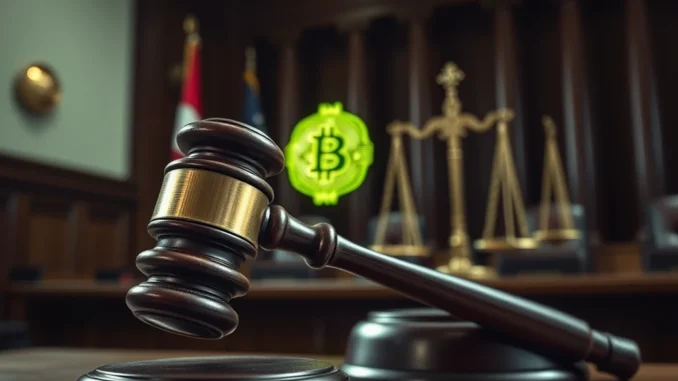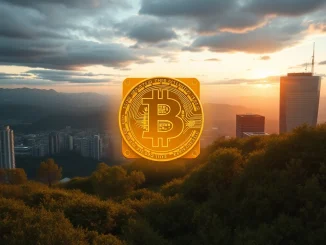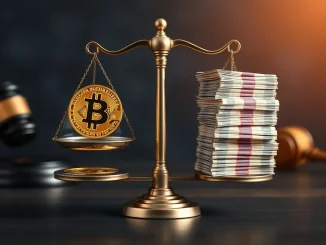
In a dramatic clash between cryptocurrency ownership and government authority, a Puerto Rico resident is facing a hefty $10,000 daily fine for refusing to surrender his Bitcoin stash. Juan Carlos Reynoso has been ordered by a judge to return 120 BTC, currently valued at around $9.7 million, to the U.S. government. His defiance has landed him in contempt of court, triggering a daily financial penalty that’s making headlines across the crypto world. This case is not just about one individual; it raises critical questions about Bitcoin seizure, crypto regulation, and the lengths governments might go to in asserting control over digital assets. Let’s dive into the details of this unfolding legal saga.
Why is a Puerto Rico Resident Facing a Massive Bitcoin Fine?
The core of the issue lies in a court order compelling Juan Carlos Reynoso to hand over 120 Bitcoin to the U.S. government. While the exact reasons behind this order aren’t explicitly detailed in the initial reports, the consequences are clear: refusal to comply is costing Reynoso a staggering $10,000 every single day. This Bitcoin fine is not a one-time penalty; it’s an escalating pressure tactic designed to force compliance. Let’s break down what we know:
- The Order: A judge mandated Juan Carlos Reynoso to return 120 BTC to the U.S. government.
- The Refusal: Reynoso has not complied with this order, leading to a contempt of court charge.
- The Penalty: For each day of non-compliance, a $10,000 fine is imposed.
- The Value at Stake: 120 Bitcoin is currently worth approximately $9.7 million, making this a high-stakes legal battle.
This situation underscores the growing tension between the decentralized nature of cryptocurrencies like Bitcoin and the regulatory frameworks of governments. It’s a stark example of how traditional legal systems are grappling with the complexities of digital asset ownership and control.
The Legal Battle Over Bitcoin: What Does This Mean for Crypto Owners?
This case in Puerto Rico highlights a crucial aspect of cryptocurrency ownership – the potential for government intervention and Bitcoin seizure. While Bitcoin is often touted for its decentralization and resistance to censorship, this situation reveals that legal jurisdictions can still exert considerable pressure, especially when traditional legal frameworks are applied. What are the broader implications for crypto holders?
- Regulatory Scrutiny is Increasing: Governments worldwide are increasingly focusing on regulating cryptocurrencies. This case is a reminder that crypto assets are not beyond the reach of legal systems.
- Importance of Legal Compliance: While the details of Reynoso’s case are still emerging, it underscores the importance of understanding and complying with relevant laws and regulations in your jurisdiction regarding cryptocurrency holdings.
- Decentralization vs. Jurisdiction: Bitcoin may be decentralized in its technology, but its users operate within geographical and legal boundaries. This case highlights the potential clash between these two concepts.
- Precedent Setting? The outcome of this case could set a precedent for how courts handle similar situations involving cryptocurrency seizure and compliance orders in the future.
For those holding Bitcoin and other cryptocurrencies, this Puerto Rico case serves as a serious wake-up call. It’s no longer enough to simply understand the technology; understanding the legal landscape is becoming equally, if not more, critical.
Puerto Rico Bitcoin and the Wider Crypto Regulation Landscape
Why Puerto Rico? While the location itself may not be inherently significant to the legal arguments, Puerto Rico’s unique status as a U.S. territory might play a subtle role in jurisdictional matters. However, the core issue here transcends geographical boundaries and speaks to the broader challenges of crypto regulation globally.
The global regulatory landscape for cryptocurrencies is still evolving, with different countries and regions adopting varying approaches. Some are embracing crypto innovation, while others are taking a more cautious, and sometimes restrictive, stance. Key challenges in regulating cryptocurrencies include:
| Challenge | Description |
|---|---|
| Cross-border Nature | Cryptocurrencies operate globally, making it difficult for individual nations to effectively regulate them in isolation. |
| Anonymity Concerns | While not entirely anonymous, cryptocurrencies can offer a degree of pseudonymity, raising concerns about illicit activities. |
| Technological Complexity | Regulators often face a steep learning curve in understanding the underlying technology and its implications. |
| Balancing Innovation and Risk | Governments must strike a balance between fostering innovation in the crypto space and mitigating potential risks to consumers and the financial system. |
The Puerto Rico case is a microcosm of these broader challenges. It demonstrates the tension between individual crypto ownership and governmental attempts to enforce legal and financial regulations within the digital asset space.
Navigating the Bitcoin Legal Battle: What Can We Learn?
The situation with the Puerto Rico resident and the Bitcoin legal battle offers several key takeaways for anyone involved in the cryptocurrency space. It’s a real-world example of the legal and financial risks that can arise from holding and managing digital assets.
Here are some actionable insights:
- Seek Legal Counsel: If you are dealing with significant cryptocurrency holdings, especially in a complex legal or regulatory environment, seeking professional legal advice is crucial.
- Understand Local Regulations: Cryptocurrency regulations vary significantly across jurisdictions. Be informed about the rules in your country and region.
- Document Everything: Maintain thorough records of your cryptocurrency transactions, holdings, and any relevant communications. This can be vital in case of legal or tax-related inquiries.
- Transparency is Key: While privacy is a core tenet of crypto, in legal contexts, transparency and cooperation may be more beneficial than outright defiance, depending on the specifics of the situation.
- Stay Informed: The cryptocurrency regulatory landscape is constantly evolving. Stay updated on the latest developments and legal precedents being set.
While the details of Juan Carlos Reynoso’s case are still unfolding, it serves as a potent reminder that the world of cryptocurrency is increasingly intersecting with the traditional legal and financial systems. Ignoring this intersection can have serious, and costly, consequences.
Conclusion: The Unfolding Drama of Bitcoin, Fines, and Government Power
The case of the Puerto Rico resident facing a $10,000 daily Bitcoin fine is a stark illustration of the growing power struggle between governments and individuals in the realm of cryptocurrency. It’s a developing story that demands attention from anyone invested in or interested in the future of digital assets. This situation is more than just a legal dispute; it’s a bellwether for the evolving relationship between crypto, law, and government control. As this case progresses, it will undoubtedly provide further insights into the complexities of Bitcoin seizure, crypto regulation, and the fundamental question of digital asset ownership in the 21st century. The crypto community will be watching closely, as the outcome could have far-reaching implications for the entire industry.



